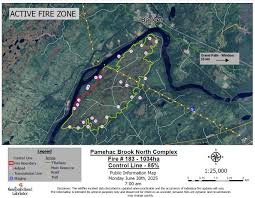The Recent Newfoundland Fires of 2023: Causes and Impacts

Introduction
The recent fires in Newfoundland have brought significant attention to environmental concerns and community resilience in the face of natural disasters. With the increasing frequency of wildfires across Canada, understanding the causes, impacts, and the response to these blazes has become imperative for both local residents and policymakers.
The Fires Overview
In early September 2023, Newfoundland and Labrador experienced extensive wildfires, leading to the evacuation of several communities as fire crews battled the blazes. The fires reportedly began due to prolonged dry conditions and uncommon heatwaves affecting the province, breaking records established in previous years; this underscores the growing impact of climate change on fire seasons. By the end of September, provincial officials reported the fires had burned approximately 25,000 hectares of land, affecting both wildlife and local ecosystems.
Impact on Communities
The immediate effects on the communities impacted by the fires have been severe. Evacuated residents faced uncertainty while waiting for clearance to return home, causing significant disruption to daily life and local economies. The government of Newfoundland and Labrador has since begun assessing the damage, with estimates indicating millions in damages to property and infrastructure.
Local authorities have mobilized resources to assist displaced residents, providing temporary shelter and support services throughout the province. Community organizations have also stepped up to provide food and medical assistance, showcasing the spirit of community solidarity in times of crisis.
Environmental Consequences
Beyond immediate human impact, the ecological ramifications of the Newfoundland fires are alarming. Experts are concerned about the loss of habitat for local wildlife and the potential for long-lasting damage to the soil and air quality. Additionally, the fires have raised concerns regarding the release of carbon monoxide and other harmful pollutants into the atmosphere, further exacerbating climate change.
Conclusion
The recent Newfoundland fires of 2023 serve as a stark reminder of the growing threat that wildfires pose, not only in terms of immediate destruction but long-term environmental consequences. As climate patterns shift, residents and policymakers alike must recognize the importance of preparedness and adaptive strategies. Forest management practices, community resilience planning, and public awareness campaigns will be crucial in addressing the challenges posed by future wildfires. The lesson from Newfoundland will echo in communities across Canada as they prepare for an unpredictable future.







